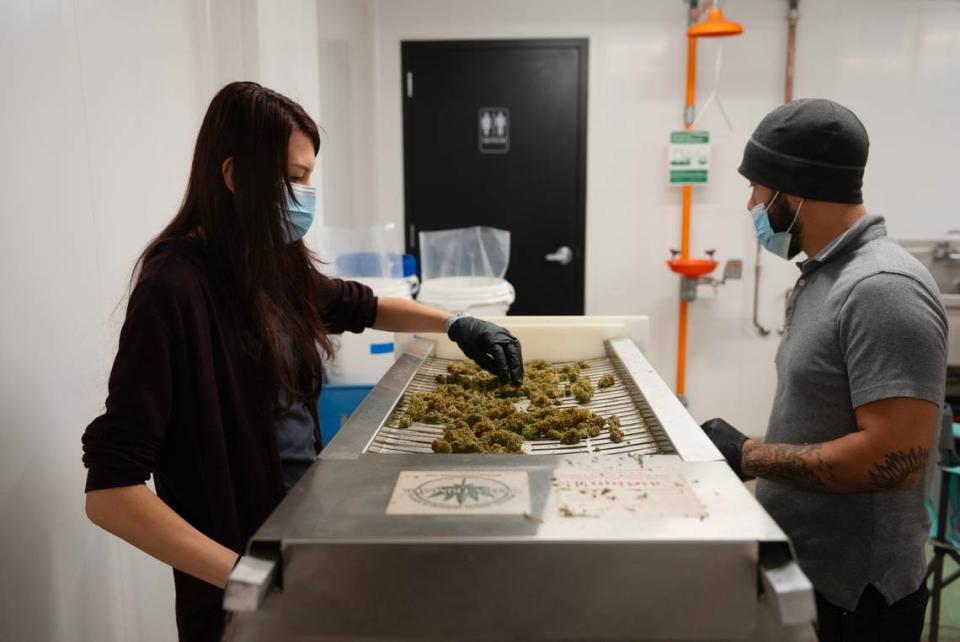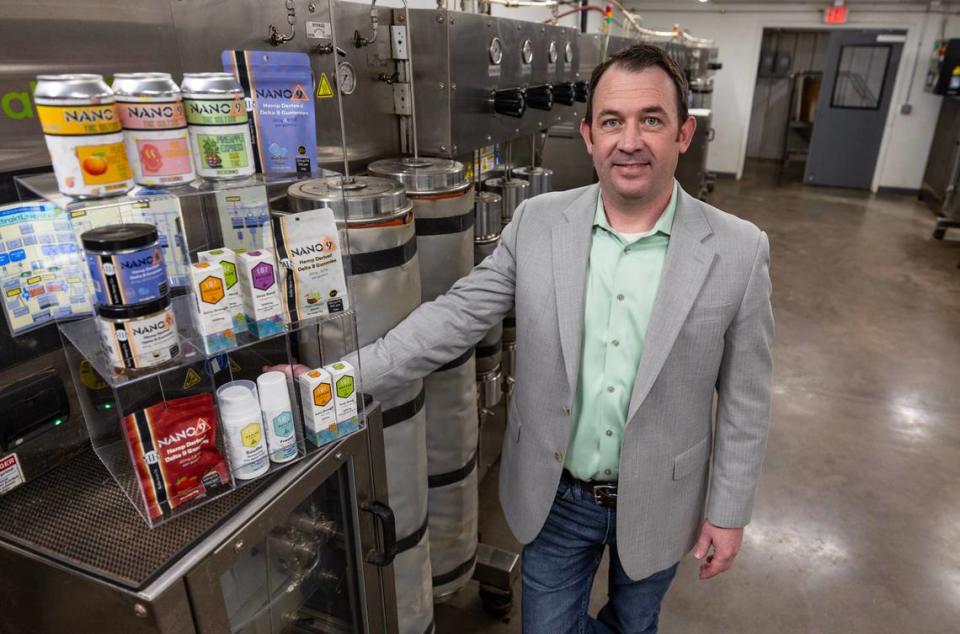Three Wichita companies, two potential bills, one big goal: passing medical marijuana
It is perhaps fitting that Kansas Natural Remedies is in a former aircraft manufacturing building near downtown.
Much like aviation, which was new to Wichita just over a century ago and became a leading industry for Kansas, the cannabis industry is still in its infancy here but backers say it is poised to grow into a major revenue producer for the state.
“It really piqued my interest,” said Sam Jones, a former corporate attorney who now is COO for Kansas Natural Remedies.
The 4-year-old company has a licensed hemp-growing facility, sells hemp nationally and is behind one potential bill to legalize medical marijuana in Kansas.
Of its 20 investors, 19 are Wichitans.
“A lot of them are very successful business people,” Jones said.
That includes his father, Wichita developer Jerry Jones.
“I like the idea of getting involved on the ground level of an emerging industry in Kansas,” Jerry Jones said. “I saw a business opportunity there.”
Emerging is one way to put it.
“Ultimately, this was a bit of a wild, wild West,” said Heath Martin, president of Wichita’s Kancanna and Butler Hemp Co. “It’s an industry almost born overnight.”
The western Kansas native has a background in agriculture and is a former sales manager for a tractor dealership in Wichita, and he said he saw an opening with the national legalization of hemp production in 2018.
“Everybody wanted to grow it, and nobody knew where to take it. I felt that I had a good understanding of all facets of the business,” Martin said.
“To me, I’m a forever optimist, and the opportunity in my lifetime to take part in an industry that had been under the wraps of prohibition for the past 100 years was just a great opportunity.”
The opportunity for the next level of the business has stalled, though. Kansas is one of a dozen states not to have some legal form of medical or recreational marijuana.
Currently, Kansans are allowed to use CBD products without THC, which is the main ingredient in marijuana.
Just as Kansas Natural Remedies is trying to bring a bill to change that, Kancanna and Butler Hemp are supporting a rival potential bill.
No one is sharing full details on that potential bill yet except to say it’s more inclusive than the proposed Kansas Natural Remedies bill, which would be a limited pilot program that allows a maximum of four operators to produce and sell medical marijuana. It would prohibit smokable products and gummies.
“This is all still in motion,” said Kelly Rippel, advisor to the Kansas Cannabis Coalition. “That’s where we need to leave it right now. This is politics.”
With only a few weeks left to introduce new bills in the legislative session, some doubt there’s time for anything to happen with either potential bill. Rippel disagrees.
He’s been lobbying on behalf of cannabis in Kansas for almost a decade and thinks this is going to be the year something will happen on the medical marijuana front.
“The likelihood of it is pretty strong,” he said. “There are conversations being had with leadership about this issue, and they know something needs to be done.”
Senate President Ty Masterson — an Andover Republican who has been a major roadblock to getting medical marijuana legalized — recently said he expects to “start to have a real discussion” on the legalization in the coming weeks.
A quick evolution
When Sam Jones put together a business plan for Kansas Natural Remedies, it quickly evolved from simply cultivating hemp — the firm sells the raw flower — to also advocating for medical marijuana.
“This is something Kansas patients have waited patiently for, and it’s something they desperately need,” he said.
After hemp growing was legalized in 2018, Jones said the financials fell apart in 2019 when the price per pound dropped precipitously and became less economically viable.
Jones said new hemp producers hit a peak in 2019.
“It slowly decreased year after year across the country.”
He said Kansas went against the trend and continued to increase.
The state had 40 licenses as of late last year.
Most of those are outdoor operators, but Jones said there are several indoor cultivators, including his company.
“Hemp is not typically grown indoors,” he said. “The quality of our product exceeds . . . a lot of the hemp that you’ll see out there.”

Hemp is a cannabis plant with less than 0.3% THC. Marijuana has more than 0.3% THC.
The company sells to out-of-state hemp distributors that use it for a number of purposes, mostly for minor cannabinoids.
There are more than 100 cannabinoids, which are compounds from the cannabis plant, such as CBD.
“CBD gets all the attention,” Jones said. “When CBD came out it was a craze.”
He said CBD on its own has no substantial benefits, though others disagree.
He said what Kansas Natural Remedies offers is a product with several kinds of cannabinoids, or a full spectrum.
“That’s when the effects start to compound, and you really start feeling the benefits of it.”
He said that might be help with sleep, pain or anxiety.
Jones said the real help would come from high-quality medical cannabis, which he said his facility is designed to produce.
Jerry Jones said part of his interest in the industry is seeing how people close to him have benefited from cannabis in relief from chemotherapy and PTSD.
For the past three years, the company has lobbied for more broad medical marijuana legislation but changed tactics this year.
“It’s clear that that strategy is not working,” Sam Jones said.
He said he and lobbyist Michael O’Donnell are appealing directly to leery conservative legislators and their constituents with a pilot program to give proof of concept.
“We’re putting this together to . . . potentially pave the way for a more fully realized medical cannabis program.”
A personal Butler
At Kancanna and Butler Hemp Co., which are located in an industrial park in southwest Wichita, Martin’s businesses are twofold.
Kancanna is the extraction side that produces large quantities of industrial hemp for existing cannabinoid products.
Butler Hemp Co. is a full-line manufacturer that produces its own tinctures, topicals, gummies and, now, seltzers.
“We are already selling all throughout the Midwest with our CBD products,” Martin said.
His silent partner happens to live in Butler County, but Martin said his partner chose the Butler name to be like a personal butler to make your day a little easier.
Kancanna grew its own hemp for two years, but Martin decided to streamline the business and focus on industrial hemp and products derived from it.
“That’s always going to be our bread and butter.”

Martin, like all Kansas hemp processors, faced a number of obstacles along the way, including licensing changes at the state level.
“It was new to everybody, so there were stumbling blocks at all levels.”
Martin said the industry has to be regulated, so it’s not a “get rich quick endeavor” even if medical marijuana becomes legal.
“We’re maybe a little more realistic than some of the other pie-in-the-sky opportunists that maybe want to take part in this industry.”
Martin said industrial hemp and CBD are where his companies’ roots are.
“All our eggs are not in a medical marijuana basket.”
If, or when, medical marijuana becomes legal, Martin said there won’t be a ramp-up period for his companies.
“We will add THC production on top of our current CBD production . . . day one,” he said.
“We are the only business that can take this from raw flower that a grower delivers to extraction to product formulation and bottling.”
The Oklahoma problem
With all the varying opinions on medical marijuana in the state, there’s one thing on which producers — and a lot of legislators — can agree: Oklahoma screwed up things for Kansas.
Sam Jones said Oklahoma’s exceptionally permissive medical program is “as close to free market as you could get.”
“Oklahoma’s program really set us back in our lobbying efforts tremendously.”
He said the state allowed a glut of operators and didn’t initially implement a seed-to-sale tracking program or a strict microbial regime, among other things.
According to a December 2022 Wall Street Journal article, the Oklahoma Bureau of Narcotics estimated the state had become one of the top sources of black-market marijuana.
Jones said a lot of legislators saw what was happening and said, “Well, this looks a lot like recreational.”
Martin agreed “that Oklahoma has put a black eye on the industry.”
He also agreed that a more conservative approach with the Legislature is necessary.
“We understand that that’s what it’s going to take to pass in the state of Kansas.”
However, Martin said the bill that Jones and O’Donnell are proposing is too restrictive not only on companies that would be able to participate but also on patients, who would be able to acquire medical marijuana in populous counties only.
“We’ve got to find something that is not Oklahoma and is conservative enough to work in our state but still give patients and caregivers access to cannabis without driving 200 to 300 miles to acquire it.”
Jones said an earlier version of his proposed bill was more restrictive about where medical marijuana could be purchased, but he said, “Under the final version of the bill . . . patients aren’t going to have any issue . . . being able to acquire it.”
Why the hurry?
Rippel said it’s imperative for something to happen with medical marijuana in Kansas because of what may happen at the federal level.
He said there’s a movement for cannabis to be rescheduled, instead of being in the same class as heroine and methamphetamine, or descheduled and taken out of the controlled substance act
States with no legal regulatory framework for businesses to operate within will open themselves up for a massive influx from other states to sell their products here, Rippel said, “which is exactly what is happening with alternative cannabinoid products.”
He said Kansas has one of the most saturated alternative cannabinoid markets in the nation with no oversight, “And it’s a huge public safety concern.”
Current Kansas law does not require a license for hemp-derived or cannabinoid-derived products, Rippel said, and he said no one has to provide quality assurance on them, either.
Martin said there’s a financial concern as well with rescheduling or descheduling.
“That would open up intrastate commerce, and if Kansas has no medical program at all, it would allow the transportation of medical marijuana through our state with no benefit to Kansas at all.”
So how to proceed?
Rippel said the alternative proposed bill would be a conservative and well-regulated version of what the Legislature has seen proposed for the last five years. He said those proposed bills also were well-regulated.
It sounds like both of the new proposed bills are more conservative than previous ones, with the Jones proposal being the most conservative.
“They’re just different approaches,” Jerry Jones said.
He said his group would be supportive of any other bill advocating for responsible medical marijuana.
Though Rippel said he wants something done yet this year, he said it needs to be the right bill.
“We need to have availability for everyone who wants and is able to participate,” he said.
“This needs to be an equitable process.”

